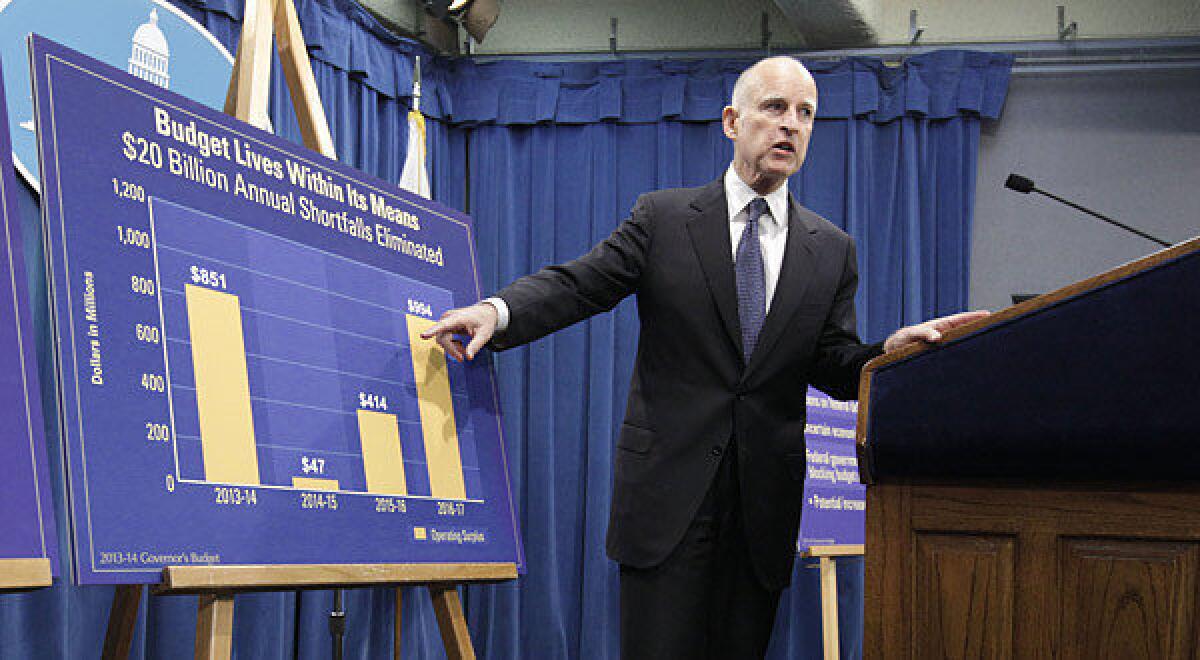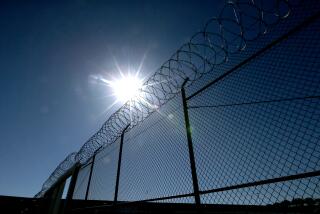Gov. Brown vows to take hard line on budget

Spending ‘in a wise way’ | 10:53 a.m.
As lawmakers debate more than a dozen different plans for raising additional taxes on things like cigarettes, marijuana, and oil, California Gov. Jerry Brown said he will take a hard line with his budget.
“We just got a nice tax,” he said of the tax increases voters approved in November. “I think we ought to take a deep breath and show we are spending it in a wise way before we start looking for money.”
Brown said he is not surprised by the latest rush of tax proposals, though.
“Everybody wants more spending,” he said. “That’s what this place is, the big spending machine. … They can push, and I can push back. At the end of the day they need the governor’s signature.”
Jerry Brown says no money in budget for prison changes | 10:47
Brown, laying out his budget, says he included no money to pay for the changes he told federal judges he would reluctantly make if ordered to continue shrinking the state’s prison population.
“We have to make our budget on what we know,” Brown said, launching into a protest of court orders for further changes despite a 43,000-inmate drop in the prison population since 2006 and the construction of a new prison medical facility to open this summer.
He cited “real big money, and not money thrown down a rathole, but money for state-of-the-art health facilities at San Quentin, at Stockton, hiring of psychiatrists, psychologists, a system of record keeping. The prisons have really invested a lot of money here.”
Brown this month told federal judges he would, under protest, ask the Legislature to fund the continued use of out-of-state prisons and to lease new prison space from unused jails in Los Angeles and Alameda counties. If federal courts order him to take those acts, Brown said he would figure out how to pay for them then. But he already has started the process of appealing those orders to the U.S. Supreme Court.
“We have a plan, and if the Legislature votes for it, then we’ll have to find money,” Brown said. “Relative to the total budget , I’m sure we could find funds.”
‘Fracking’ concerns | 10:41 a.m.
The governor said he was conflicted on whether there should be an expansion of “fracking” in California.
“I have to balance my strong commitment to dealing with climate change, renewable energy, to what could be a fabulous economic opportunity,” he said. “This could be good. But there are issues. And I want to look at it.”
The governor would not say whether he supports a moratorium on fracking that is being contemplated by lawmakers. Brown said energy companies are still developing their strategies for an expansion of the practice, and there is time for the state to review their plans.
“There are a lot of technical engineering issues,” he said. “I think we have time to do it right.”
Getting Legislature on board | 10:40 a.m.
Brown was asked if the Legislature will go along with his plan to shift more education money to less-advantaged students. He responded that it is a natural move for a Legislature controlled by Democrats.
“I think the idea in a Democratic Legislature of helping the less advantaged is very persuasive,” he said.
If the tea party were in control, he said, lawmakers “might look at it more skeptically.” But he said he believed Democrats, in their “heart of hearts,” support the concept.
Pressed on the fairness of the plan, the governor joked that well-off families living in comfortable suburbs could always move to Compton or Watts to be eligible for the extra money.
Support for counties housing former inmates | 10:37 a.m.
California counties struggling to cover the cost of housing former state prison inmates in their jails deserve a $72-million increase in state support, Brown said. He said the added money is not a sign that his prison realignment program is struggling, but an acknowledgment that the cost incurred by counties has turned out to be higher than the state calculated in 2011.
“We think that is a fair representation of the cost of inmates who are now being handled locally,” the governor said of the increased funding. “Like everything in life, we learn from life and we adjust accordingly.”
State parole costs have dropped dramatically, by more than $50 million, as California has put on county probation most of the state prison inmates who are freed.
Indigent care payments unchanged | 10:33 a.m.
Brown’s budget plan leaves unchanged about $1.5 billion in funds the state pays to counties to care for the indigent.
Brown said that over time, he expects to reduce that money, as more of the state’s uninsured obtain insurance coverage under the new federal law. His budget says “a mechanism will be established to determine the level of county savings based on actual experience.”
The decision is a win for locals who feared the proposal would cut their healthcare funding.
Brown also said he wants to take a state-based approach to expanding the Medi-Cal, the state’s health insurance program for the poor.
In January, Brown said he was also considering a county-based system, but has since scrapped those plans.
DOCUMENT: Gov. Jerry Brown’s revised budget
“A lot of give and take” | 10:26 a.m.
“I’m sure there will be a lot of give and take as we go through the process,” Brown said when asked about no increased funding for courts, which are struggling financially.
“Obviously their costs are going up and we’ve got to figure out ways to control it,” he said. “It is not that easy.”
But Brown said courts are just one institution that has grown accustomed to getting more funding than the state can afford.
“Everybody has to get used to managing,” he said “We have been used to this over-commitment.”
Brown said the state is turning now to “honest budgeting” and “careful budgeting.”
Brown willing to negotiate | 10:24 a.m.
Asked whether he was “drawing a line in the sand” with his education plan, Brown said he was willing to negotiate.
“There have been governors before who drew lines in the sand,” he said. “I don’t do that.”
But he said he felt strongly about his plans.
“I believe in this formula,” he said. “I believe it is just. … I am going to do everything I can to get it. I am pretty confident we have got a powerful principle. There is the political power of all those affected and there is the moral power” of bringing equality to those who are treated unequally.
Amount for schools | 10:22 a.m.
Brown’s budget includes $39.9 billion in general-fund spending for K-12 schools.
Schools received $2.9 billion more than originally anticipated because of stronger-than-projected economic growth over the first six months of this year.
Brown is pushing to change the way schools are funded, hoping to direct more money to school districts that serve non-native English speakers and poorer students.
General fund spending | 10:20 a.m.
Gov. Jerry Brown proposed general-fund spending of $96.4 billion in the coming fiscal year, $1.3 billion less than he called for in his initial budget proposal in January.
The May revision also includes $41.9 billion in spending from dedicated funds and $7.4 billion from bond funds, for a total of $145.7 billion.
Administration officials said Brown downgraded his general fund spending projection because the federal government did not extend the payroll tax credit, and the state reduced by half its projection for personal income growth.
Unanticipated tax revenue going to schools | 10:17 a.m.
“We have a balanced budget and it is solid,” Gov. Jerry Brown said as he unveiled his budget plans. “We got more money because people voted for it and most of that money is going to schools.”
But he warned that the state needs to be cautious. Nobody anticipated the budget issues created by the federal sequester.
“This is a prudent budget,” he said. “It is one that unlike those of the past is going to be very prudent, because we are dialing into some uncertain times.”
Trying to interpret budget numbers can be dizzying. In this case, the size of the budget the governor is proposing is actually smaller than the budget he proposed in January. Yet the state would spend billions more on schools. How? California accounting. The flood of unanticipated tax revenue that arrived in state coffers over the last six months is not being put on the books for the upcoming budget year. It is instead being given to schools retroactively. So the money would be reflected in adjustments to the size of previous years budgets, even though it would be spent in the fiscal year starting July 1 2013.
Times live updates
Gov. Jerry Brown on Tuesday morning will lay out his vision for spending a windfall of about $4.5 billion in revenue that has landed in state coffers over the last several months.
As the economy has improved, so have the state’s fortunes. But the governor’s options for using the unexpected money, to be detailed in a revised budget plan at 10 a.m., will be limited by laws put in place by voters decades ago.
The Times’ Sacramento Bureau will have live coverage.
ALSO:
California lawmakers approve blank budget bills
Jerry Brown files notice to appeal prison ruling to Supreme Court
Jerry Brown’s budget ‘surplus’ could be used entirely for schools
More to Read
Get the L.A. Times Politics newsletter
Deeply reported insights into legislation, politics and policy from Sacramento, Washington and beyond. In your inbox three times per week.
You may occasionally receive promotional content from the Los Angeles Times.






